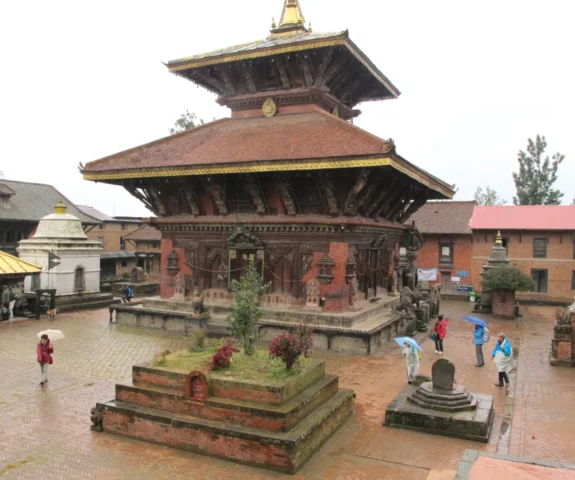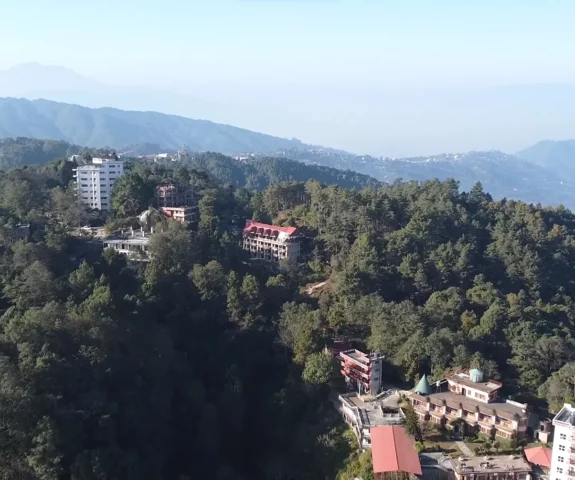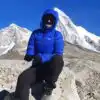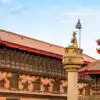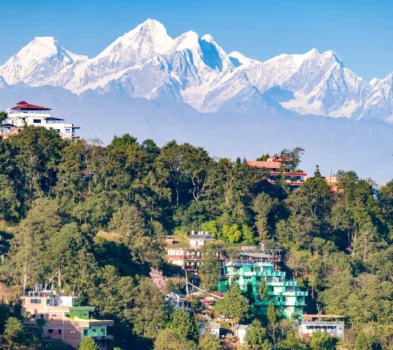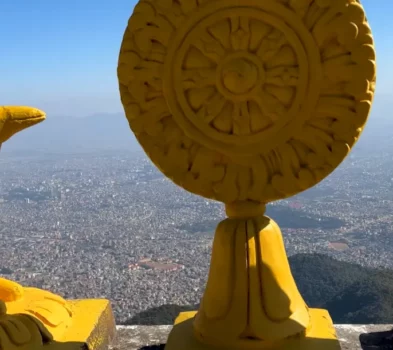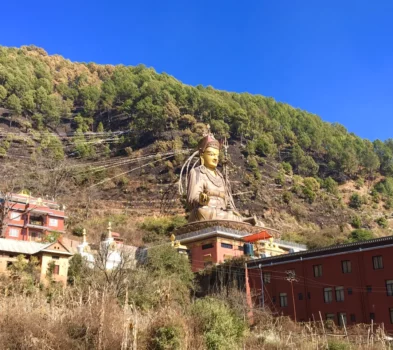Duration
2 Days
Bhatgaon, Nagarkot & Changunarayan Hike
Trip Grade
EasyGroup Size
1-16 PeopleMax Altitude
2,175m. / 7,136ft.Best Season
Feb- May/ Sept- NovActivity
HikingMeals
Breakfast, Lunch & DinnerAccommodation
ResortTransportation
Private VehicleTrip Customization
On request (click here)Highlights of Bhatgaon, Nagarkot & Changunarayan Hike
- Panoramic views of the Himalayas during the sunrise and setting at Nagarkot hill top
- Cultural immersion in Bhaktapur (Bhatgaon) and rural villages
- Sightseeing walk through fertile forests and terraced lands
- See ancient Changunarayan Temple (UNESCO World Heritage Site)
- Family-friendly, beginner-friendly day hike with any fitness level
- Easy Kathmandu Valley escape with private transport and experienced local guides
These are the highlights of an amazing journey. The itinerary of Bhatgaon, Nagarkot & Changunarayan Hike in details is given below:
Trip Introduction
The Bhatgaon, Nagarkot & Changunarayan Hike is a scenic short adventure around the rim of the Kathmandu Valley that combines natural beauty with cultural heritage. This guided walk will help you to explore the busy city of Kathmandu and explore quiet villages and significant historical sites in the hills in two days. It is a great option when a traveler does not want to have a long and arduous hike to enjoy the Nepalese scenery and culture.
On Day 1, the journey begins with a morning drive from Kathmandu to Bhaktapur (also known as Bhadgaon). This is an historical city of Newari which is characterized by ancient temples, traditional houses, and rich cultural environment. It then moves on a brief drive to Sankhu after which the hiking trail begins after some time of sightseeing the old city.
The walk begins at Sankhu and slowly ascends over terraced agricultural land, pine forest and small rural villages. You can see the local life and have a mountain air on your way. It is possible to reach Nagarkot, a major Himalayan hill station, by afternoon. On very clear days, you may see distant Himalayan peaks and sometimes even Mount Everest far on the horizon. During the evening, you may have a pretty sunset and spend the night at a nice hotel in Nagarkot.
On Day 2, you will get up early in the morning and enjoy the sunrise on the Himalayan range Nagarkot. The hike proceeds after breakfast down the hill to Changunarayan. The path is winding along the hills and through forests and well-preserved villages, and because of its easy level, it is a nice walk with a lovely sight of the valley.
Towards the end of the morning, you will reach the Changunarayan Temple which is among the oldest Hindu temples in Nepal and part of the UNESCO-listed Kathmandu Valley World Heritage Site. You can go sightseeing around the temple complex and have a look at Kathmandu Valley. This is followed by a private vehicle taking you back to Kathmandu after the visit.
Himalayan Adventure Treks organizes the Bhatgaon, Nagarkot & Changunarayan Hike with experienced local guides, private transportation, and friendly service. This is an enjoyable quick hiking trip that is suitable to the family, beginners and other travelers who have limited time to explore the nature and culture of Nepal.
Outline Itinerary of Bhatgaon, Nagarkot & Changunarayan Hike
Day 01: Drive from Kathmandu to Bhatgaon and Hike to Nagarkot
Day 02: Hike from Nagarkot to Changunarayan
Our guests sharing their experiences (Photo/Video Gallery)
Detail itinerary of Bhatgaon, Nagarkot & Changunarayan Hike
Day 01: Drive from Kathmandu to Bhatgaon and Hike to Nagarkot
Our trip will start with Kathmandu to the ancient city of Bhaktapur. We will reach it after approximately one hour and will have some time to see its gorgeous pagoda temples and Newari architecture. We shall start at Bhaktapur and then make a brief drive to Sankhu where our walk will start.
Our hiking will begin at Sankhu, and will be done along a slow uphill path through the green forests and terraced farms. On our way, we will cross small towns where we will have an opportunity to observe the everyday life of locals. The path passes through rhododendron forests and pine trees and is a calm walking experience that is suitable for most travelers with normal fitness who are comfortable walking for a few hours.
Our hiking will take approximately four hours after which we will be at Nagarkot, which is at an elevation of 2,175 meters. We shall enter our resort and have time to rest and relax. Late in the afternoon, we will walk to a certain view point to have a nice sunset view of the Himalayan range. We will have dinner in the evening and spend the night in a nice resort in Nagarkot.

Activity: Drive & Hike, 7–9 hours (approximately 4 hours of hiking, including sightseeing and transfers)

Max. Altitude: 2,175m/7,136ft. Nagarkot

Meal: Lunch & Dinner

Accommodation: Resort
Day 02: Hike from Nagarkot to Changunarayan
We will get up early to see the sunrise in Nagarkot where we have perfect views of the Himalayan peaks on a clear weather day. In the morning, when we have breakfast, we will start on our downhill walk to Changunarayan. The route is a moderate ridge and traverses agricultural, woodland and old fashioned villages.
The walk itself will take place alongside the local villagers and will also include the Kathmandu Valley and the hills. The walk is nice and mostly downhill hence comfortable and enjoyable. In approximately four hours of walking, we will arrive at Changunarayan Temple which is at approximately 1,600 meters.
We will visit the Changunarayan Temple, which is one of the oldest Hindu temples in Nepal and is part of the UNESCO-listed Kathmandu Valley World Heritage Site. We will get an opportunity to visit the areas of the temple and get to know about its history and cultural significance. Our private vehicle will then take us back to Kathmandu after the visit, and it takes a journey of approximately 1 hour. The Bhaktapur, Nagarkot & Changunarayan Hike will finish at mid-day when we arrive in the city.

Activity: Hike & drive, 5 -7 hours (approximately 4-6 hours of hiking)

Max. Altitude: 2,175m/7,136ft. Nagarkot

Meal: Breakfast & Lunch
Note:
If you have your own private group and want to make your trip private, we can run the custom trip all the day as per your requirements and group size.
Includes and Excludes
What are included with package?
- One Night 3 hotel in Nagarkot with Dinner & Breakfast: Accommodation in a 3-star hotel in Nagarkot, including dinner and breakfast, is provided as part of the package.
- All transportation by private vehicle: All transportation for the trip, including to and from Nagarkot, will be provided in a private vehicle for comfort and convenience.
- Experience & helpful tour guide: A professional, experienced, and friendly tour guide will accompany you throughout the trip to ensure a pleasant experience.
- Entrance fee: Entrance fees to any relevant attractions during the tour are included in the package.
- Hiking permit: A hiking permit for your trip will be arranged and provided as part of the package.
- All necessary paperwork: All necessary documentation, such as permits and legal paperwork, will be managed for you.
- Drop and pickup for Hiking: The package includes transportation for drop-off and pickup at the hiking location.
- Medical supplies (first aid kit): A first aid kit will be available throughout the trip for any minor health emergencies.
- All government taxes: The package covers all government taxes and fees associated with the trip.
What are not included with package?
- Travel and rescue insurance: Travel and rescue insurance is not included in the package, and it is recommended to purchase this separately to cover potential emergencies during the trip, such as medical issues or evacuation.
- Personal expenses (phone calls, laundry, bar bills, bottled water, etc.): Any personal expenses, such as phone calls, laundry services, alcoholic drinks, bottled or boiled water, and other personal purchases, are not covered by the package and will be at your own expense.
Pick Your Suitable Date
Book a Private Trip
Private & Group Discount Price
-
1 -
1 person
US$ 600
-
2 -
2 people
US$ 400
-
3 -
5 people
US$ 350
-
6 -
10 people
US$ 300
-
11 + people
9999
US$ 250
Total Cost:
US$ 600
Route Map & Altitude Chart
Kathmandu Hotel
Start/End point
Kathmandu Hotel
Trip Information
Weather and Best Time for the Bhatgaon, Nagarkot & Changunarayan Hike
Weather is an important reason when planning the Bhatgaon, Nagarkot & Changunarayan Hike as it influences walking comfort and mountain views. This hike is accessible year-round, but there are times of year that provide a better overall experience. Spring and autumn are considered the best seasons for this hike, because of the weather which is stable and pleasant.
Spring lasts on from February to May and is a very beautiful time in the hills around Nagarkot. During this season the forests become green with flowers. The temperature during the day is comfortable for walking and usually remains between the fifteen and twenty five degrees Celsius. Mountain views are often clear, especially in the mornings and evenings. Spring is a good idea for those traveling for nature and for those who enjoy mild weather.
Autumn is between September and November and is another good time to go for the Bhatgaon, Nagarkot & Changunarayan Hike. The air is fresh post the monsoon rains and visibility is very good. This season is the best opportunity to observe wide views of Himalayas from Nagarkot. Days are sunny and dry, which makes hiking pleasant and safe.
The summer monsoon season between June and August brings frequent rain. Trails may be muddy and clouds may obscure mountain views, but the countryside is very green and peaceful. Winter from December to January is dry and clear but mornings and evenings can be very cold. With warm clothing winter hiking is possible. For the best comfort and views, spring and autumn are highly recommended.
Food and Drink during Bhatgaon, Nagarkot & Changunarayan Hike
Food and drink during the Bhatgaon, Nagarkot & Changunarayan Hike are simple and filling and strongly tied to the local culture. Most of the hiking packages include meals as per the itinerary which includes breakfast, lunch, and dinner during the trip. The overnight stay at Nagarkot boasts of comfortable dining options with fresh meals.
You will get a chance to eat traditional Nepali foods such as dal bhat which consists of rice, lentil soup, vegetables and sometimes pickles. This meal is very popular in hikers, because it is good energy for walking. Other popular dishes are noodles, fried rice, soups, momos and seasonal vegetables. The food is typically mild in taste though it can be adjusted as per your taste preference be it less or more spice.
Along the hiking trail you can pass through small villages where you can get local shops and tea houses. Tea, coffee, light snacks, and bottled drinks are sold in these places. Stopping to have tea is also a nice way to rest and interact with local people. Prices are reasonable and service friendly.
Drinking sufficient water is very important at the time of the hike. You should bring around a reusable water bottle and you can refill it at hotels or tea shops with safe drinking water. Your guide will help you to find boiled or filtered water. Drinking untreated water from the tap or streams can also be a source of illness so avoid drinking it. All in all, the food and drink during the Bhatgaon, Nagarkot & Changunarayan Hike is both comfortable and enjoyable.
Altitude Sickness on Bhatgaon, Nagarkot & Changunarayan Hike
Altitude sickness is not a major concern on the Bhatgaon, Nagarkot & Changunarayan Hike as the height of the trip is Nagarkot around two thousand one hundred seventy five meters. This altitude is lower than the point at which altitude sickness starts to become a serious problem for most travellers.
People that come straight from sea level may notice a slight change in breathing while walking uphill. This is normal and will usually go away fairly quickly as the body adjusts. The pace of hiking on this trip is gentle and that makes everyone feel comfortable throughout the hiking.
To minimize any slight discomfort that may be felt, it is important to walk slowly, drink plenty of water and take short breaks when necessary. If you feel tired, have mild headache or feel light dizziness you should inform your guide and rest for a while. In most cases, rest and hydration are all that is required to feel better.
The Bhatgaon, Nagarkot & Changunarayan Hike follows trails close to villages and roads, so help is always nearby if required. There is no need to have special acclimatization days or altitude medication for this hike. With sensible walking habits and proper hydration, travelers of all ages can enjoy the hike with ease without having to worry about altitude sickness.
Visa and Permits for Bhatgaon, Nagarkot & Changunarayan Hike
Travelers who are going to do Bhatgaon, Nagarkot & Changunarayan Hike must possess a valid Nepal tourist visa. Most of the foreign nationals can easily get visa on arrival at the Kathmandu international airport. The process is simple, and it only takes a short time in most cases. At least 6 months from their travel date, your passport should be valid.
The visa fee is based on the length of stay and payment is typically made in major currencies. It is also useful to bring a passport sized photo along in order to speed up the process. You may also apply visa prior in Nepali embassy, however, it is optional.
In this hike, no special permits are to be taken to hike since the path does not pass into the national parks or restricted regions. Nevertheless, foreigners can purchase an entrance ticket to such cultural places as the Bhaktapur Durbar Square and Changunarayan Temple.
If you book the Bhatgaon, Nagarkot & Changunarayan Hike through some tour company, these entrance fees are usually included in the package. Your guide will take care of the ticket arrangements so that you don’t have to worry during the trip. Always carry a copy of your passport and visa with you when you travel in Nepal.
Health and Safety of the Bhatgaon, Nagarkot & Changunarayan Hike
Health and safety are important aspects of the Bhatgaon, Nagarkot & Changunarayan Hike. This is an easy and safe hike, however, basic care will help to ensure a smooth hike. The trails are well used and pass through villages, forests and open hill paths.
Wearing good walking shoes that have a good grip is highly recommended. Some areas of the trail can be uneven or slippery, especially after rains. Walking slowly on the downhill sections which will help prevent injury. Your guide will have a basic first aid kit and will have experience of minor problems such as blisters or small cuts.
Sun protection is important even while in cooler weather. Wearing a hat, sunglasses and sunscreen will help protect you from the strong sunlight. In warmer months insect repellent may be helpful in forested areas. Always drink safe water and eat freshly prepared food.
Wildlife sightings are uncommon and usually consist of birds or monkeys. Avoid approaching animals too closely and do not feed animals. In busy places such as Bhaktapur, watch out for your belongings. By taking a few simple precautions the Bhatgaon, Nagarkot & Changunarayan Hike is a safe, relaxed and enjoyable experience.
Transportation for the Bhatgaon, Nagarkot & Changunarayan Hike
Transportation for the Bhatgaon, Nagarkot & Changunarayan Hike is well organized and comfortable, allowing travelers to enjoy the journey without stress. All transfers by road are typically organized by Himalayan Adventure Treks using a private vehicle. This makes travel easy and saves time as compared to public transport.
On the first day of the hike, you will be picked up from your hotel at Kathmandu in the morning. The drive to Bhaktapur takes some forty five minutes depending on traffic. From Bhaktapur the vehicle is further driven to Sankhu which is the starting of the hike. These drives are short and provide nice views of the outskirts of the cities, farmlands and local villages.
During the hike any additional luggage can be safely stashed in the vehicle or at the hotel in Nagarkot. The vehicles used are clean and comfortable and fit for the road condition. Drivers are well trained and have been on the local routes most of their lives, and this contributes to the comfort and the safety.
On the second day, when hiking at Changunarayan is over, a personal car will be ready to drive you back to Kathmandu. The back drive usually takes 1 hour. This easy passage provides you with an opportunity to have a rest after the hike and admire the view on the way.
The benefit of having private vehicle will also imply that you do not need to worry about getting cabs or riding overcrowded buses. Overall, transportation during the Bhatgaon, Nagarkot & Changunarayan Hike is reliable, comfortable, and designed to support a relaxed travel experience.
Travel Insurance for the Bhatgaon, Nagarkot & Changunarayan Hike
Travel insurance is strongly recommended for the Bhatgaon, Nagarkot & Changunarayan Hike even though it is a short and low risk trip. Insurance provides protection and peace of mind in the event of any unforeseen circumstances when you are on your trip.
Your travel insurance should cover hiking activities and simple medical treatment. This hike should be covered under many standard travel insurance plans which already include low altitude hiking under the coverage. Precisely, when reading your policy details, it is necessary to make certain that hiking is included.
Health institutions are easily accessible because the hike is near Kathmandu. Nevertheless, insurance proves useful when there is an illness, injury or the necessity to be in hospital. Insurance may also be helpful in the other cost such as delaying trips, cancellations or missing connections.
Before you begin the hike you should carry a copy of your insurance policy as well as the emergency contact number of the insurance provider. Inform your guide if you have insurance details with you as this can be useful in the event of an emergency.
Although serious problems are very unlikely on the Bhatgaon, Nagarkot & Changunarayan Hike, having travel insurance allows you to enjoy the experience with confidence and without unnecessary worry.
Extra Expenses on the Bhatgaon, Nagarkot & Changunarayan Hike
The Bhatgaon, Nagarkot & Changunarayan Hike package usually covers most major costs such as transportation, accommodation, meals mentioned in the itinerary, and guide services. Nevertheless the travelers are still advised to have some additional personal expenses on the trip.
Additional costs can be snacks, beverages or snacks sold during the trail or at rest stops. Goods like, tea, coffee, soft drinks and light snacks are marketed in small local stores and tea houses.These costs are generally low, but it is a good idea to carry some local currency.
Personal shopping is another possible cost. Bhaktapur is known for handicrafts and souvenirs and local products. The personal expense is also through the donations at the temples or additional sightseeing that is not included in the itinerary.
Tipping guides and drivers is not necessary but welcome in case you are satisfied with the service. Amount depends on you and on your satisfaction and budget. Most often tips are given at the end of the trip.
Another thing to remember regarding Nepal visa fee is in case you are taking a visa on arrival. Having a small amount of additional budget in case of any unforeseen necessity is always good. Overall, extra expenses on the Bhatgaon, Nagarkot & Changunarayan Hike are manageable and easy to plan for.
Language and Communication during the Bhatgaon, Nagarkot & Changunarayan Hike
Language and communication during the Bhatgaon, Nagarkot & Changunarayan Hike are generally easy and comfortable. The major language spoken in the region is Nepali but a significant number of individuals in tourist places know simple English.
Your guide will speak English and assist with communication during the hike. In the villages, people may speak their own ethnic languages, but friendly gestures and smiles are always welcome. If you want to pick up a few of the local words you will be more than welcome to have your guide assist.
Mobile phone coverage is relatively good on the way and in Nagarkot. Major mobile networks operate in most areas but signal can be weak in some parts of forest areas. Most hotels in Nagarkot have wifi, so you can keep in touch with your family and friends.
At Changunarayan and Bhaktapur, the service of communication is good as these areas are near Kathmandu. Overall, language is not a barrier on the Bhatgaon, Nagarkot & Changunarayan Hike, and staying connected during the trip is easy and convenient.
Don’ts on the Bhatgaon, Nagarkot & Changunarayan Hike
To respect local customs and ensure a safe and pleasant journey, please keep the following don’ts in mind during the Bhatgaon, Nagarkot & Changunarayan Hike. These are some basic rules, which allow preserving nature, culture and local communities and make your experience even better.
- Do not litter or pollute the environment
Never leave your waste behind but bring it with you until you get a good dustbin. The paths, settlements and vistas on the hike are clean and serene and must be so. Plastic wrappers or bottles should not be tossed along the trail. It is strongly advised to use reusable water bottles and bags to decrease the number of wastes.
- Do not disrespect religious sites
Local people have significant spiritual places, i.e. the temples and shrines. When going to such sites as Changunarayan Temple, you should always take off your shoes before entering and dress decently. Do not act loudly within the temples. Do not use the photographs in the temples or the religious ceremonies without the clearly given permission.
- Do not disrespect local customs and traditions
Local culture is an important part of the Bhatgaon, Nagarkot & Changunarayan Hike. Treat villagers in a polite way. In Nepal, eating or giving people something with the left hand is rude. Always seek their permission before taking photos of the local people, and also keep their wishes in mind in case they refuse.
- Never walk alone, out of the group
Never leave your guide or group, particularly in woody parts, or in the lanes of a village. It is not safe to walk alone as you may fall in private land or holy places. Your instructor is familiar with the right paths and assists in making sure that all are safe.
- Do not negotiate in an unpleasant and aggressive manner
It is normal to bargain in places like Bhaktapur but in a friendly and an acceptable manner. Arguing and pushing hard over small sums is not worth it. It should be borne in mind that local artisans rely on their sales to earn their living.
- Do not feed animals or stray animals
You will see monkeys around temples or dogs in villages. Giving them to eat may lead to violent behavior and medical issues. Animals should preferably be viewed at a distance and should not be induced to interact.
By following these don’ts, you show respect to local people and help preserve the beauty and harmony of the Bhatgaon, Nagarkot & Changunarayan Hike.
Trip Extension after the Bhatgaon, Nagarkot & Changunarayan Hike
If you have extra time in Nepal, extending your journey after the Bhatgaon, Nagarkot & Changunarayan Hike is a wonderful idea. This increase will be a brief but significant experience and by adding a couple of days you will be able to discover Nepal in a deeper way at your own speed.
- Take a closer look at Bhaktapur
Bhaktapur is a very easy place to add an extra day or night as the hike starts there. You may also stroll around the Bhaktapur Durbar Square, pottery shops, museums and Newari quarters. To spend the night will give you an opportunity to see the city in the early morning and evening when it is less active and calmer.
- Kathmandu Valley cultural tourism
You can include one or two days to visit the other UNESCO World Heritage sites in Kathmandu Valley. Among these are the Pashupatinath Temple, Boudhanath Stupa, Swayambhunath and patan Durbar square which are famous places. These places will make you learn more about the history of Nepal, its religion and the way people live their life.
- Day hike or short walk
There are numerous picturesque hiking trails in Kathmandu assuming that you like walking. You may attempt Nagarkot to Dhulikhel hike, Chisapani to Nagarkot hike, Champadevi hike or Phulchowki hike. The trails have various sceneries and perspectives.
- Adventure of wildlife or river
To have a different view, you may go to the Chitwan National Park to have a jungle safari or raft the Trishuli River. Such visits normally last two to three days and provide adventure to your vacation.
- Visit Pokhara and surroundings
Pokhara is a place that is characterized by lakes, mountainous scenery and leisure. Even a short stay of two or three days is very rewarding and complements the Bhatgaon, Nagarkot & Changunarayan Hike beautifully.
These extensions will be organized by Himalayan Adventure Treks according to your time, interests and style of traveling.
Photography and Drone Rules on the Bhatgaon, Nagarkot & Changunarayan Hike
Photography is one of the highlights of the Bhatgaon, Nagarkot & Changunarayan Hike, as the route offers beautiful landscapes, historic sites, and village life. Taking photos is usually permitted, but one has to remember to respect people and places and act according to the local rules.
- Adhere to photography principles at places of worship
Numerous temples and shrines have certain photography regulations. The photography in such places as Changunarayan Temple may be limited within the inner temple premises. Always look at signboards and take advice of your guide. Temple architecture and surroundings are the best to be photographed as opposed to religious rituals.
- Seek permission before taking pictures of the locals
The trail passes through villages inhabited by local families that are leading their daily lives. In case you wish to make a close up shot of an individual, then seek first permission. It is easy to make many people agree, but anyone who is uncomfortable or declines must be respected.
- The usage of drones must be authorized
To fly drone in Nepal, an authorization is normally necessary. The surroundings of heritage buildings, settlements, and special zones can be limited. Never come and use a drone without consulting your guide. Drones used illegally can create issues with the local government.
- Be careful with camera equipment
When walking, leave your camera or phone in a safe place and particularly in rough paths. Straps or keeping devices in your backpack will help to prevent damage. The weather is unpredictable, hence it is best to carry a cover or dry bag to store electronics.
By following these photography and drone rules, you can capture memorable moments while respecting culture and regulations during the Bhatgaon, Nagarkot & Changunarayan Hike.
Major Attractions of the Bhatgaon, Nagarkot & Changunarayan Hike
The Bhatgaon, Nagarkot & Changunarayan Hike offers a rich mix of culture, history, and natural beauty within a short distance. Such an increase will enable you to enjoy some of the most valuable highlights of the Kathmandu Valley in an easy and fun manner.
- Old city and Bhaktapur Durbar Square
Bhaktapur, also known as Bhatgaon, is one of the best preserved medieval cities in Nepal. You will find the temples in the form of pagoda, royal courts, stone statues and traditional houses as you pass through the old city. Key attractions are the Nyatapola Temple, the tallest temple in Nepal and the 55 Window Palace. A stroll in Bhaktapur is like a time travel and it creates a rich local cultural and historical atmosphere.
- Nagarkot perspectives and natural landscapes
Nagarkot is popular as extensive Himalayan panoramas as well as serene hilltop location. In varied perspectives, when the conditions are clear, you can see snowcapped mountains, as well as the ranges that range between Langtang to Mount Everest. Sunset and sunrise are particularly beautiful and the color of the sky and mountains changes. Nagarkot is an ideal hiking destination because of the fresh air and serene environment allowing one to unwind after the hike.
- Changunarayan Temple and its vicinity
Changunarayan Temple is the oldest Hindu temple in Nepal and is a World Heritage Site of UNESCO. The temple has been characterized by the elaborate carvings on wood and stone, antique statues and historical writing. The location is on a hill-top with charming views of Kathmandu Valley and the surrounding villages.
These attractions together make the Bhatgaon, Nagarkot & Changunarayan Hike a balanced journey of nature, culture, and heritage.
Essential Packing Gear for Bhatgaon, Nagarkot & Changunarayan Hike
If you have decided to go on a day Hike trip in Nepal, we assure you that you will have a fantastic time ahead. But what should you pack? What will be the right gear to make your trip more fabulous? To help you with this, we have compiled a packing list of essential items that you mustn’t forget to bring along.
- Cash
- A 30 L Daypack that has room for your essentials, such as camera, clothing, water bottle, jacket, raincoat, etc, which will be carried by you
- Protective transport cover for a backpack or travel bag
- Hiking Boots: Preferably ankle-high boots to prevent ankle sprain
- Quick-drying shirts made of synthetic fabrics
- Warm and cool vests or T-shirts
- Sports Bra for Female Trekker
- Hiking shorts
- Sun hat, and sunglasses with 100% UV protection (for hiking trips, even with stray light and nose protection)
- Sunscreen lipstick with a high SPF (at least 20, for a hike trip, or at least 30, or sunblock)
- Drinking bottled water
- Wet wipes
- Hand sanitizer
- Camera with sufficient memory cards and spare batteries, or a battery charger
- Toilet paper
- Map
- Binoculars
Equipment Note:
- Plus, we will also gift you a company logo T-shirt as a token of your Hiking experience in Nepal with us.
Frequently Asked Questions
What is the Bhatgaon–Nagarkot–Changu Narayan Hike?
The Bhatgaon–Nagarkot–Changu Narayan Hike is a scenic cultural day hike around Kathmandu Valley, combining village exploration, nature trails, and Himalayan views. It starts from Bhatgaon (Bhaktapur), ascends to Nagarkot, and descends to the UNESCO World Heritage site Changu Narayan Temple.
How long is the Bhatgaon to Nagarkot to Changu Narayan Hike?
The entire hike spans approximately 20–22 kilometers (12–14 miles) and typically takes 5–6 hours over two days, making it a perfect overnight hike from Kathmandu. It’s an easy-moderate trail suitable for most fitness levels.
What are the major highlights of this hike?
Highlights include the Newar cultural experience in Bhaktapur, panoramic sunrise and sunset views from Nagarkot, and exploring the ancient Changu Narayan Temple, a UNESCO World Heritage site known for its artistic stone carvings and historic value.
Is the Bhatgaon–Nagarkot–Changu Narayan hike suitable for beginners and families?
Yes, it’s a family-friendly and beginner-level hike near Kathmandu, ideal for those who want to explore nature, culture, and heritage without strenuous trekking. Children and older adults with average fitness can enjoy this peaceful trail.
What mountain ranges can be seen from Nagarkot?
From Nagarkot, you can enjoy stunning views of the Langtang, Ganesh, and Jugal Himal ranges, and on clear days, even Mt. Everest is visible in the far distance. It’s a famous destination for sunrise mountain views near Kathmandu.
What is special about Changu Narayan Temple?
Changu Narayan Temple is the oldest Hindu temple in Nepal, dedicated to Lord Vishnu. It’s a UNESCO World Heritage Site known for its exquisite stone, metal, and wood carvings, representing Lichhavi-era architecture and spiritual heritage.
What is the best time to do this hike?
The best seasons are spring (March–May) and autumn (September–November) when the weather is clear, and mountain views are stunning. However, it’s also a year-round day hike near Kathmandu with pleasant conditions most of the year.
Do I need a guide for the Bhatgaon–Nagarkot–Changu Narayan Hike?
This is a well-marked and popular hiking route, so you can do it independently or with a local guide. Hiring a guide enhances your understanding of Newar culture, local traditions, and hidden viewpoints.
How do I get to the starting point of the hike?
You can reach Bhatgaon (Bhaktapur) from Kathmandu by private car in about 1 hour. From there, you begin your hike through traditional villages and terraced farmlands toward Nagarkot.
What should I pack for this hike?
Pack light hiking gear, including comfortable walking shoes, a hat, sunscreen, water bottle, snacks, and a camera. If staying overnight in Nagarkot, bring a light jacket for the chilly morning and evening mountain weather.







